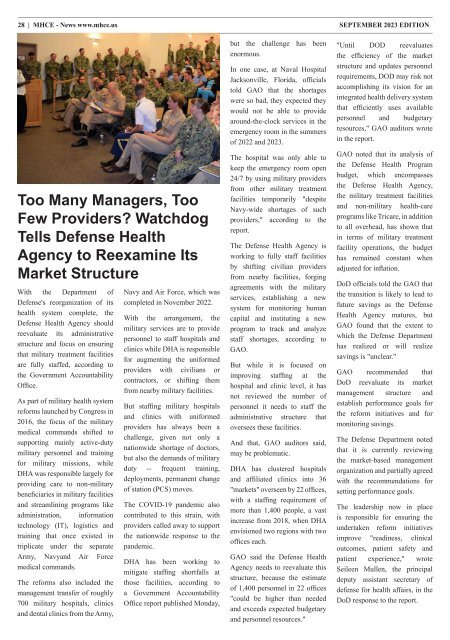Create successful ePaper yourself
Turn your PDF publications into a flip-book with our unique Google optimized e-Paper software.
28 | <strong>MHCE</strong> - News www.mhce.us SEPTEMBER <strong>2023</strong> EDITION<br />
Too Many Managers, Too<br />
Few Providers? Watchdog<br />
Tells Defense Health<br />
Agency to Reexamine Its<br />
Market Structure<br />
With the Department of<br />
Defense's reorganization of its<br />
health system complete, the<br />
Defense Health Agency should<br />
reevaluate its administrative<br />
structure and focus on ensuring<br />
that military treatment facilities<br />
are fully staffed, according to<br />
the Government Accountability<br />
Office.<br />
As part of military health system<br />
reforms launched by Congress in<br />
2016, the focus of the military<br />
medical commands shifted to<br />
supporting mainly active-duty<br />
military personnel and training<br />
for military missions, while<br />
DHA was responsible largely for<br />
providing care to non-military<br />
beneficiaries in military facilities<br />
and streamlining programs like<br />
administration, information<br />
technology (IT), logistics and<br />
training that once existed in<br />
triplicate under the separate<br />
Army, Navyand Air Force<br />
medical commands.<br />
The reforms also included the<br />
management transfer of roughly<br />
700 military hospitals, clinics<br />
and dental clinics from the Army,<br />
Navy and Air Force, which was<br />
completed in November 2022.<br />
With the arrangement, the<br />
military services are to provide<br />
personnel to staff hospitals and<br />
clinics while DHA is responsible<br />
for augmenting the uniformed<br />
providers with civilians or<br />
contractors, or shifting them<br />
from nearby military facilities.<br />
But staffing military hospitals<br />
and clinics with uniformed<br />
providers has always been a<br />
challenge, given not only a<br />
nationwide shortage of doctors,<br />
but also the demands of military<br />
duty -- frequent training,<br />
deployments, permanent change<br />
of station (PCS) moves.<br />
The COVID-19 pandemic also<br />
contributed to this strain, with<br />
providers called away to support<br />
the nationwide response to the<br />
pandemic.<br />
DHA has been working to<br />
mitigate staffing shortfalls at<br />
those facilities, according to<br />
a Government Accountability<br />
Office report published Monday,<br />
but the challenge has been<br />
enormous.<br />
In one case, at Naval Hospital<br />
Jacksonville, Florida, officials<br />
told GAO that the shortages<br />
were so bad, they expected they<br />
would not be able to provide<br />
around-the-clock services in the<br />
emergency room in the summers<br />
of 2022 and <strong>2023</strong>.<br />
The hospital was only able to<br />
keep the emergency room open<br />
24/7 by using military providers<br />
from other military treatment<br />
facilities temporarily "despite<br />
Navy-wide shortages of such<br />
providers," according to the<br />
report.<br />
The Defense Health Agency is<br />
working to fully staff facilities<br />
by shifting civilian providers<br />
from nearby facilities, forging<br />
agreements with the military<br />
services, establishing a new<br />
system for monitoring human<br />
capital and instituting a new<br />
program to track and analyze<br />
staff shortages, according to<br />
GAO.<br />
But while it is focused on<br />
improving staffing at the<br />
hospital and clinic level, it has<br />
not reviewed the number of<br />
personnel it needs to staff the<br />
administrative structure that<br />
oversees these facilities.<br />
And that, GAO auditors said,<br />
may be problematic.<br />
DHA has clustered hospitals<br />
and affiliated clinics into 36<br />
"markets" overseen by 22 offices,<br />
with a staffing requirement of<br />
more than 1,400 people, a vast<br />
increase from 2018, when DHA<br />
envisioned two regions with two<br />
offices each.<br />
GAO said the Defense Health<br />
Agency needs to reevaluate this<br />
structure, because the estimate<br />
of 1,400 personnel in 22 offices<br />
"could be higher than needed<br />
and exceeds expected budgetary<br />
and personnel resources."<br />
"Until DOD reevaluates<br />
the efficiency of the market<br />
structure and updates personnel<br />
requirements, DOD may risk not<br />
accomplishing its vision for an<br />
integrated health delivery system<br />
that efficiently uses available<br />
personnel and budgetary<br />
resources," GAO auditors wrote<br />
in the report.<br />
GAO noted that its analysis of<br />
the Defense Health Program<br />
budget, which encompasses<br />
the Defense Health Agency,<br />
the military treatment facilities<br />
and non-military health-care<br />
programs like Tricare, in addition<br />
to all overhead, has shown that<br />
in terms of military treatment<br />
facility operations, the budget<br />
has remained constant when<br />
adjusted for inflation.<br />
DoD officials told the GAO that<br />
the transition is likely to lead to<br />
future savings as the Defense<br />
Health Agency matures, but<br />
GAO found that the extent to<br />
which the Defense Department<br />
has realized or will realize<br />
savings is "unclear."<br />
GAO recommended that<br />
DoD reevaluate its market<br />
management structure and<br />
establish performance goals for<br />
the reform initiatives and for<br />
monitoring savings.<br />
The Defense Department noted<br />
that it is currently reviewing<br />
the market-based management<br />
organization and partially agreed<br />
with the recommendations for<br />
setting performance goals.<br />
The leadership now in place<br />
is responsible for ensuring the<br />
undertaken reform initiatives<br />
improve "readiness, clinical<br />
outcomes, patient safety and<br />
patient experience," wrote<br />
Seileen Mullen, the principal<br />
deputy assistant secretary of<br />
defense for health affairs, in the<br />
DoD response to the report.


















